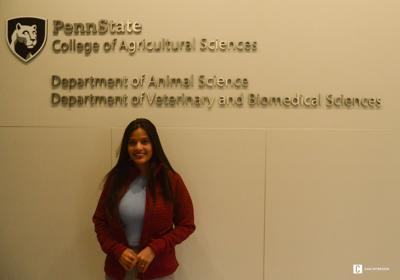Before coming to Penn State in 2019 for a master’s degree in agronomy and crop science, Divya Pant spent her entire life living in Jhalari, a small village in Nepal.
Pant, a graduate research assistant in the biorenewable systems graduate program in Penn State’s College of Agricultural Sciences, said she came from a farming family, which is where her inclination and love for agriculture began.
In Nepal, Pant said women are in charge of the agricultural system but are “never given the value of what [they] do in the family, in the community, in the society as a whole.”
“The face front would be a man, but I would be the hand that is doing all the work and not getting enough recognition and financial stability for that,” Pant said.
Even in her own house, Pant said she saw her mother struggle the same way. If her mother hadn’t fought for her basic rights to education, Pant said she feared she wouldn’t have received an education, a platform and the ability to study more.
For her, coming to the U.S., more specifically Penn State, was a way for her to learn more about the conventional agriculture system, conduct sustainability work and work to better serve women in Nepal.
“I really speak for women in that perspective because it's a suffering that they have, but at the same time, if you can work on them, then it can change the face of the country,” Pant said.
With that in mind, Pant started a waste management organization called Carbon Compost, now known as Carbon A-way, which she founded in 2021 to convert waste into sustainable energy and fertilizer.
Pant and her colleague Ram Neupane entered the Ag Springboard Competition, an annual business pitch competition at Penn State, and they placed second, winning a $2,500 prize.
During this time, Pant said she was also working to find collaboration for her startup in Nepal, but as a graduate student at the time, getting people to listen to her was difficult.
Pant said that’s when she decided to enter the Miss Nepal North America pageant to be heard by others.
“It’s not just about the beauty but the brains,” Pant said. “At the end of the day, I have a vision, and I want to make that happen.”
Throughout the process, Pant said she struggled with keeping herself motivated all of the time and remaining confident; however, after entering the pageant and speaking to a mass of people, spreading her ideas and smiles, Pant said she received the platform and reassurance she needed, along with future networking opportunities.
“You grow in so many ways — in terms of your personality [and] in terms of how you present yourself in front of people,” Pant said.
Neupane, a doctoral candidate in the department of plant pathology and environmental microbiology in the College of Agricultural Sciences, said he knew of Pant when he came to Penn State in 2021 because of the small Nepali community on campus.
Neupane said Pant told him about the Ag Springboard Competition and asked if he was willing to collaborate for the competition.
Through connecting her two worlds — Nepal and Penn State — Pant said she was hoping to develop a system that not only speaks for the people but also the environment.
“It should serve people, their needs, and do better for the environment,” Pant said.
Christine Costello, Pant’s Ph.D. adviser, said when she started working with Pant in the summer, she was impressed with her ambitious projects and motivation to work through complicated sustainability issues.
MORE NEWS COVERAGE
‘If you don’t, you’re f-----’| Penn State students discuss academic stress during Thanksgiving break
For many Penn State students, Thanksgiving is a time for them to put their feet up and rest.…
Costello, an assistant professor in the department of agricultural and biological engineering in the College of Agricultural Sciences and a research associate in the Rock Ethics Institute, said there’s a need to better represent biological systems within carbon frameworks, and it’s been helpful having Pant around with her plant science “expertise.”
“I think it's really a good time for us to be connecting,” Costello said. “I'm very happy, and I hope it works out for everybody.”
As an adviser, Costello said there’s a concern that some students may be “overextended,” but to her, if anyone could do it, it’d be Pant.
“It's hard for national scientists to go into the metric accounting world because we make a lot of assumptions, and it's just different… we’re all learning,” Costello said. “We kind of get stuck in the United States thinking about very high-efficiency systems, and we don't… consider how a system could be useful outside of the context of, ‘We must make a bunch of money with the system at all times.’”
Having worked with her primarily in the designing and planning stages of the project, Neupane said he knows Pant as a “determined, smart and talented person who can accept any challenge that comes her way.”
Despite having to leave the project during its initial phase due to time constraints, Neupane said he still followed the progress of the project and was happy Pant “took the lead.”
“I'm very confident that [Pant] will be successful in this project given her energy, hard work and charisma,” Neupane said. “I'm very optimistic that this project will have a real impact on the people and to the environment.”
With the waste management system being based in Nepal, Pant said her project was a way to speak on behalf of the women in agriculture and the environment, and to show how hard their life is and what others can do to make it better.
“There needs to be systems designed for them, but that is not how the reality is,” Pant said. “I was very motivated to follow their passions and be able to speak for women in agriculture, poverty [and] food insecurity.”
Going forward, Pant’s ambitions for her project include expanding the model to be adopted in every country to address energy and food crises.
“I think it's really critical to think about where technologies can be useful in multiple contexts, multiple cultures, multiple scales,” Costello said. “For her own work within Nepal, I think it's serving a certain community and needs… it's serving a real problem, so that's enormously crucial to sustainability.”
MORE NEWS COVERAGE
The Nittany Meadow Farm introduced its new “Goats2Go” van Friday at noon with a ceremonial r…







